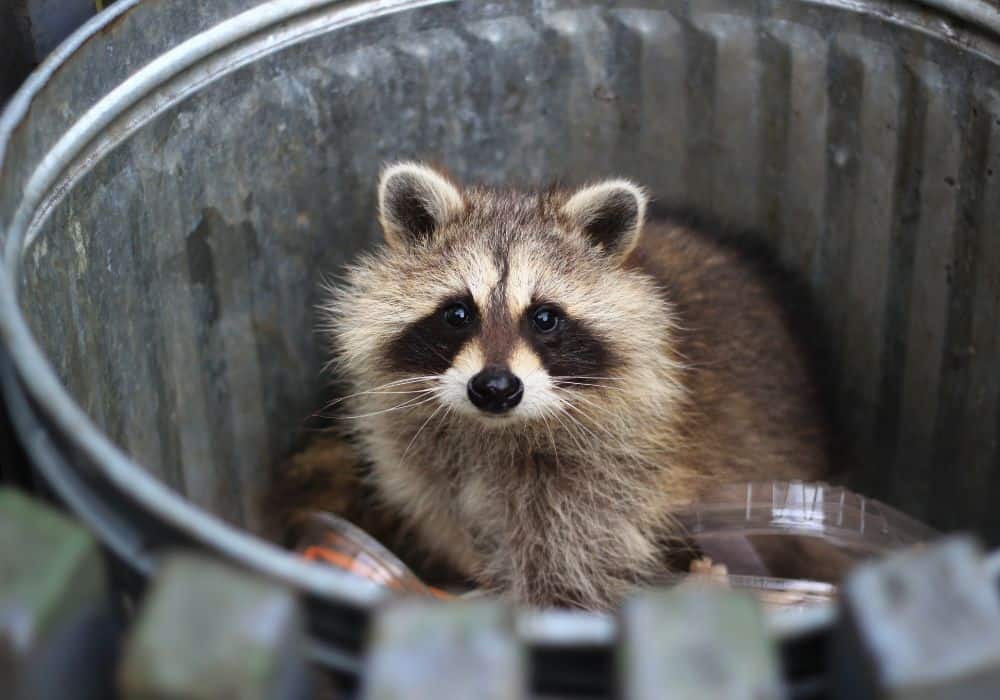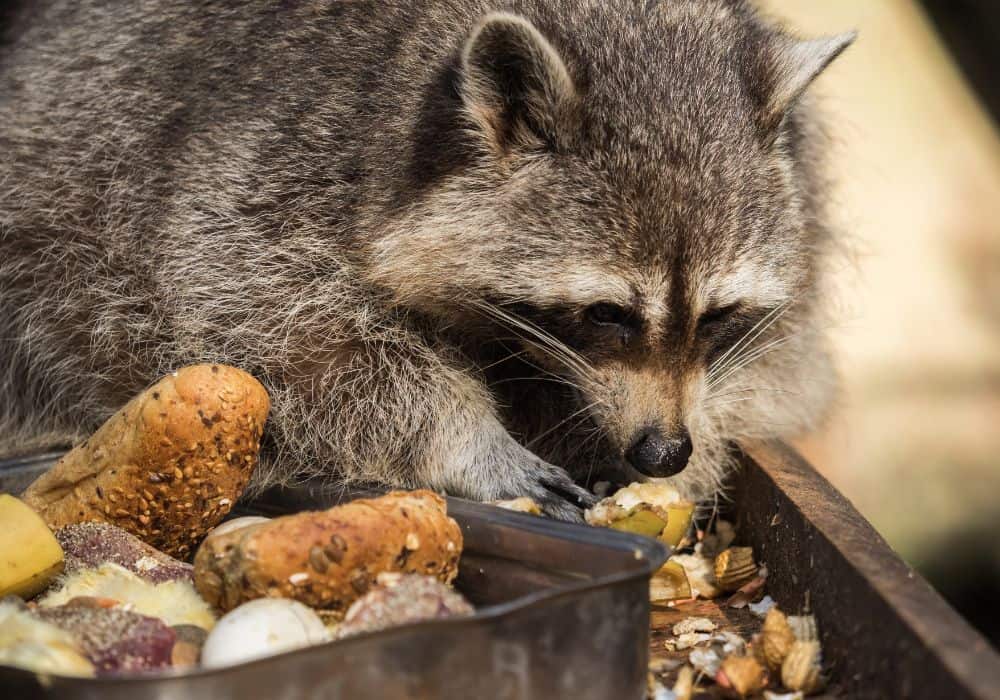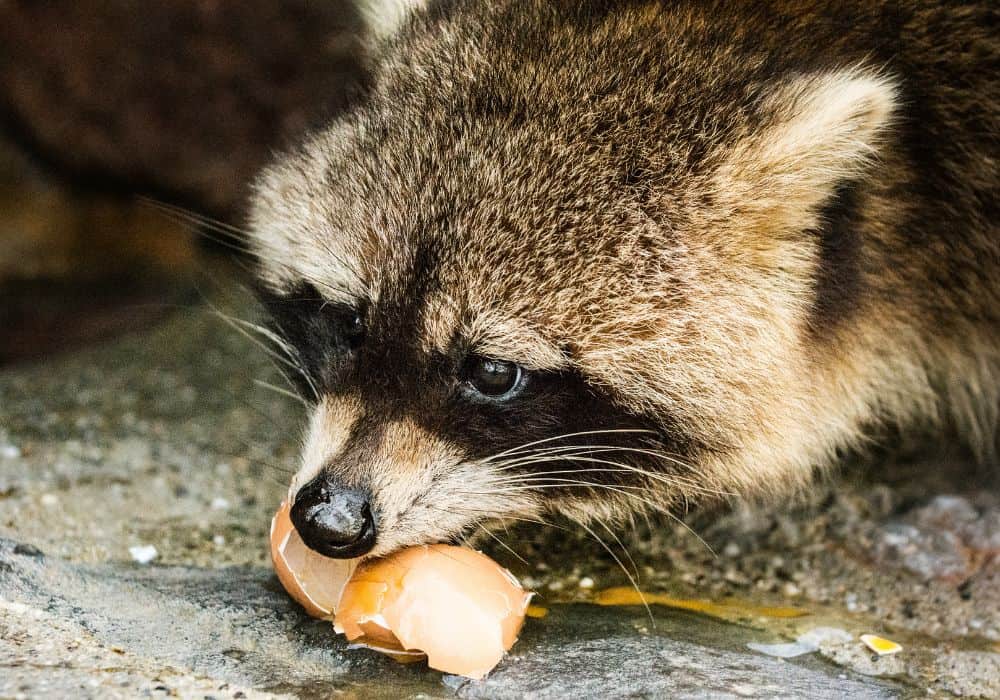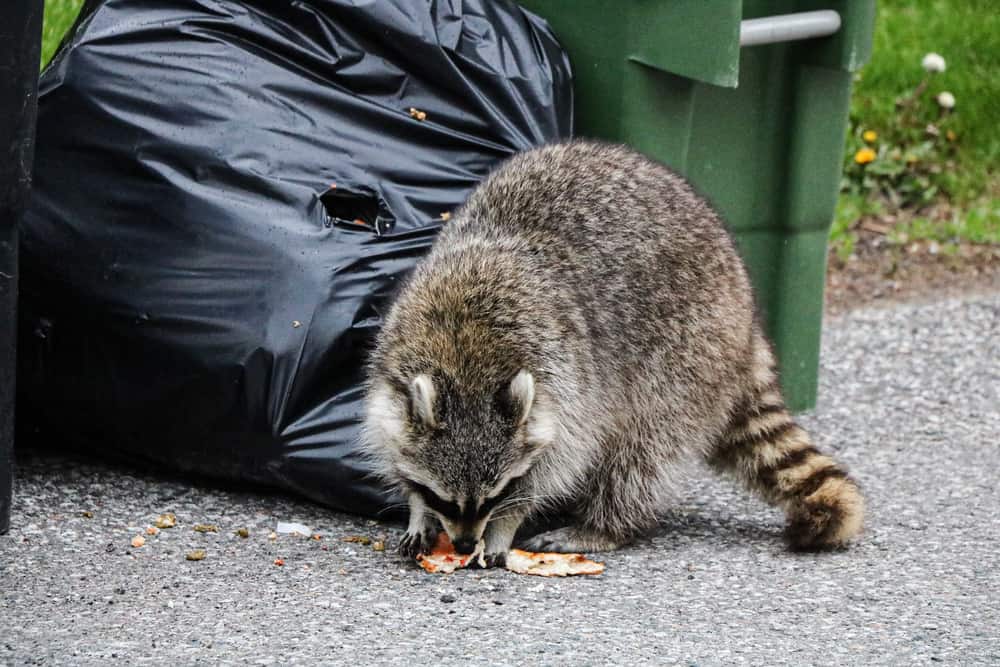Raccoons are so cute, you just want to give them a squeeze. But, most of us know better than to do that. They are famous carriers of rabies and also tend to enjoy spending their time raiding local garbage cans.
Though they may have the cute nickname of “trash pandas,” the trash-eating habit really isn’t that cute. You might be wondering why raccoons are so deeply attracted to the contents of your trash cans. We’re going to explain it and offer advice on how to handle it.
So, why do raccoons eat stuff out of garbage bins?

Raccoons are creatures that tend to be fairly curious, but their curiosity alone is not the reason why they eat your garbage. The truth is that it’s a mix of two important factors. First, raccoons are natural scavengers. They don’t hunt their food or graze. They search for it and eat it.
Garbage cans happen to be giant containers filled with—you guessed it, scraps of food we didn’t eat. Since raccoons are omnivores, they see our omnivorous diet remains in the trash and decide that it’s a veritable all-you-can-eat buffet.
The other big reason why raccoons choose to eat garbage deals with their environment. In urban areas, raccoons can’t exactly scavenge the same way they do in rural areas. It’s not like we have hay bales or piles of berries or eggs in birds nests in cities.
Without wildlife to scavenge from, garbage cans and dumpsters become the raccoon’s new dining venue.
Is it safe for raccoons to eat garbage?
Yes and no. Raccoons are omnivores. So, it’s not like they’re going to get sick from eating the remains of your chicken chow mein. They also won’t eat foods that smell too rotten or moldy. Oh, and raccoons also wash all their food before they eat it. It’s pure instinct.
For what it’s worth, raccoons make a serious effort to keep safe while they eat.
However, that doesn’t mean that all the foods people eat are safe. Foods like garlic, chocolate, raisins, or worse, rat poison that is spilled out of a container, can kill a raccoon. For their own safety, it’s best not to give raccoons access to your garbage cans.
Is it safe to try to remove raccoons from your trash areas yourself?
No! Raccoons can carry rabies and other diseases. Even if they don’t bite you, they can still harm you because they typically carry fleas and other parasites. Bringing those into your home can pose serious problems for you and your pets.
Did you find a raccoon stuck in a garbage can? Do not try to fish it out yourself, especially bare-handed. Call animal control or a pest control company instead. It’s better to be safe than sorry, right?
How do you prevent raccoons from eating your garbage?
As anyone who has ever dealt with raccoons can tell you, tying your garbage up in plastic bags is not enough to dissuade them from finagling food. They’re called “trash bandits” for a reason. They are really into the garbage! Here’s how you can change that…
1. Add Scents They Hate
Hot red pepper, garlic, ammonia, and mothballs are all said to keep raccoons away. They are very strong scents, which works well with the belief that raccoons have keen senses of smell. This can be fairly effective, but be careful with this option.
It’s important to note that ammonia, onions, and garlic can actually hurt the raccoons. You don’t want to hurt them! You just want them to go away, right? The best option for that is to simply spread mothballs close to the cans.
PRO TIP – You can also buy raccoon repellent to spray around your trash bin. Like with all other deterrents and scents, you should keep these things away from pets. It’s better to be safe than sorry.
2. Place Your Cans Near Dust
If there is one thing raccoons hate with a passion, it’s the feeling of dust. They can’t stand the feeling of dust or powder on their paws. It’s one of the reasons why they’re famous for washing their hands.
To prevent raccoons from getting near your garbage cans, consider putting baby powder, powdered cornstarch, or even diatomaceous earth around the perimeter of your trash can. This can help dissuade them, but you have to have a wide berth of dust.
Otherwise, you might end up with a mess and a bunch of raccoons that just stepped over the line. Another option would be to add dust to the top of your trash bags. It’ll upset the raccoons enough for them to stop eating your trash.
3. Secure Trash Lids
You shouldn’t underestimate the dexterity that raccoons have. Unlike squirrels and small rodents, raccoons have fairly grippy paws and are able to lift up trash can lids on their own. You need to make it hard for them to do so.
Securing your lids with a bungee cord, a rubber band, or even a lock can make a huge difference in the number of raccoons out and about.
PRO TIP – Many companies now sell trash cans that are specifically designed to help keep creatures out of them. You can find a locking trash can online or at your local hardware store. Just make sure your community allows them first!
4. Spook Them With Lights
Raccoons are nocturnal and prefer to scavenge in the hidden part of the night. This means that well-lit areas will not appeal to them. Most won’t even go near them. An easy solution to your raccoon problem is to keep trash cans in a well-lit area.
If you want to go “whole hog,” get motion-detecting lights. A device like that will ensure they stay away.

5. Clean Up Pet Food
Trash aside, you need to keep other sources of food away from raccoons if you don’t want them lurking on your property. Wild raccoons adore eating cat food and dog food. If you have pets, you need to keep their food under lock and key.
Leaving pet food (or any other food scraps) outside is a lot like waving a banner inviting pests in. Even if it doesn’t attract raccoons, it could attract mice, snakes, or even coyotes. Do you want that in your yard? We think not.
6. Clean Up the Water
Remember how we mentioned that raccoons wash their food before they eat it? Yep, that’s a thing. That also means they are more likely to dine in areas close to a source of fresh water. It makes life easier for them.
If you keep a water bowl, bird bath, or water fountain in your yard, you may want to let that dry out for a bit. Reducing their access to water will make most raccoons choose a different yard. Once they’re gone, you can turn your fountain on again.
PRO TIP – A pool cover doesn’t just protect your pool from frogs and snails. It also can help prevent raccoons from choosing to eat at your place.
7. Get Rid Of Dens
Raccoons generally only raid garbage cans close to their dens. They’re creatures of convenience, much like us. This means that if you have an issue with raccoons on your property, they likely have a den nearby.
Having an exterminator or a pest control company can help you figure out where the raccoons live. They also will help you trap them, release them, and advise you on how you can prevent them from returning.
In most cases, this will include filling in tree hollows, getting rid of debris in your yard, and adding a fence underneath your home. If you aren’t sure where they are nesting, ask a pest control expert.

8. Spook Them With Sound
Like most other wildlife, raccoons do not want to be caught by predators. They associate predators with loud noises, growling, or hissing. If you want to play on their natural instincts, the best thing you can do is to install a motion-sensing device that makes a loud noise.
Whenever raccoons go near your garbage can, they will hear the device go off. This will startle them into thinking that there is a source of danger nearby. It’ll keep your trash safe, and it won’t harm them in the process.
In conclusion…
Trash pandas might look cute enough to cuddle, but they are not the type of critter you want anywhere near your home. This is doubly true when it comes to trash. They tear apart trash bags and leave debris everywhere!
Having a game plan that involves the right smells, the right lighting, and the right pest control can help you keep your garbage bags intact. Like with all things pest-related, the right setup will always go a long, long way.
